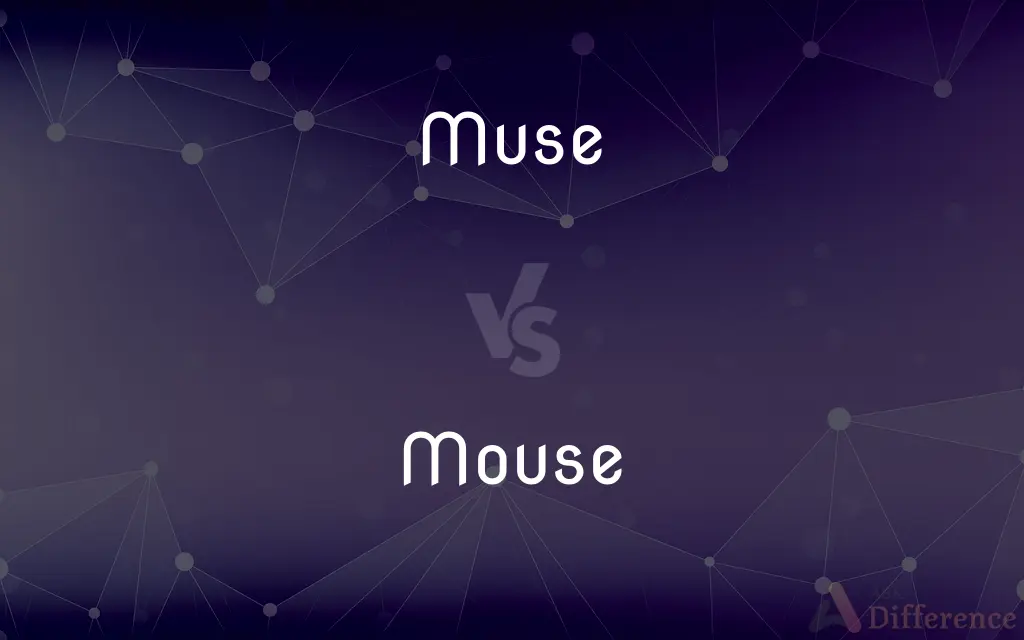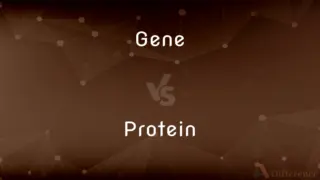Muse vs. Mouse — What's the Difference?
Edited by Tayyaba Rehman — By Urooj Arif — Updated on April 21, 2024
Muse refers to a source of artistic inspiration or a classical goddess, whereas a mouse is a small rodent or a computer input device.

Difference Between Muse and Mouse
Table of Contents
ADVERTISEMENT
Key Differences
A muse in literature and mythology traditionally refers to one of the nine goddesses who inspire the creation of literature and arts. On the other hand, a mouse is best known as a small mammal with a pointed nose, furry round body, large ears, and a long, often hairless, tail.
The term muse also broadly signifies any source of inspiration, particularly in creative endeavors. In contrast, in technology, a mouse refers to a hand-held electronic device that helps users interact with a computer by moving a pointer on the screen.
Historically, the concept of the muse has been integral to ancient Greek culture, where muses were considered divine patrons of the arts and sciences. Meanwhile, the mouse as an animal has been a part of human life as both a pet and a pest, historically significant in various cultural contexts for different reasons.
In modern usage, someone might say they have a muse when they refer to a person or an experience that significantly drives their creative output. Conversely, when referring to the device, the term mouse denotes an essential tool for navigating and interacting with digital environments.
While the muse can be a catalyst for creativity and artistic expression, enhancing human culture, the mouse (as an animal) plays different roles in the ecosystem, such as serving as prey for various predators, which contributes to the biological cycle of life.
ADVERTISEMENT
Comparison Chart
Definition
A source of inspiration in artistic endeavors
A small rodent or a computer input device
Origin
Greek mythology
Middle English (rodent), Late 20th century (device)
Role in Culture
Inspirational, divine
Practical, widely used in computing and research
Symbolic Meaning
Creativity, artistry
Modesty, intrusion, or functionality in technology
Usage in Modern Context
Refers to inspiring entities or individuals
Refers to both the animal and the computing device
Compare with Definitions
Muse
A mythological goddess inspiring creativity.
Many artists invoke the muse before starting their work.
Mouse
A pointing device for computers.
He bought a new mouse for his laptop.
Muse
In modern culture, often used to describe influential muses in fashion.
The celebrity became the designer’s muse.
Mouse
Often wireless in modern setups.
Her mouse connects via Bluetooth.
Muse
Someone who inspires an artist.
The painter’s partner was his muse.
Mouse
Essential for graphical interface navigation.
It’s difficult to edit images without a mouse.
Muse
Use in poetry and literature as a metaphor.
His latest book refers to the city as his muse.
Mouse
Has various buttons for different functions.
Gaming mice come with additional buttons for more control.
Muse
An inspirational force or influence.
Nature often serves as a muse for poets.
Mouse
Can be optical or mechanical.
Modern mice use laser technology for more precision.
Muse
To be absorbed in one's thoughts; engage in thought.
Mouse
A small rodent with a long tail.
The mouse scurried across the kitchen floor.
Muse
To consider or say thoughtfully
Mused that it might take longer to drive than walk.
Mouse
Commonly used in scientific research.
The lab uses mice for genetic studies.
Muse
A state of reflection.
Mouse
Subject in various cultural stories and myths.
Mice are often depicted as clever and resourceful in folklore.
Muse
Greek Mythology Any of the nine daughters of Mnemosyne and Zeus, each of whom presided over a different art or science.
Mouse
A mouse, plural mice, is a small rodent. Characteristically, mice are known to have a pointed snout, small rounded ears, a body-length scaly tail, and a high breeding rate.
Muse
A guiding spirit.
Mouse
A small rodent that typically has a pointed snout, relatively large ears and eyes, and a long tail.
Muse
A source of inspiration
The lover who was the painter's muse.
Mouse
A small handheld device which is moved across a mat or flat surface to move the cursor on a computer screen
The right mouse button
Copy the file with a click of the mouse
Muse
Muse(Archaic) A poet.
Mouse
A lump or bruise on or near the eye
She touched the mouse under her eye
Muse
(of people) A source of inspiration.
Yoko Ono was John Lennon's wife, lover, and muse.
Mouse
(of a cat or owl) hunt for or catch mice
Female cats are usually much better at mousing than males
Muse
(archaic) A poet; a bard.
Mouse
Use a mouse to move or position a cursor on a computer screen
Simply mouse over any item on the list
Muse
An act of musing; a period of thoughtfulness.
Mouse
Any of numerous small rodents of the families Muridae and Cricetidae, such as the house mouse, characteristically having a pointed snout, small rounded ears, and a long naked or almost hairless tail.
Muse
A gap or hole in a hedge, fence, etc. through which a wild animal is accustomed to pass; a muset.
Find a hare without a muse. (old proverb)
Mouse
Any of various similar or related animals, such as the jumping mouse, the vole, or the jerboa.
Muse
(intransitive) To become lost in thought, to ponder.
Mouse
A cowardly or timid person.
Muse
(transitive) To say (something) with due consideration or thought.
Mouse
(Informal) A discolored swelling under the eye caused by a blow; a black eye.
Muse
(transitive) To think on; to meditate on.
Mouse
Pl. mice or mous·es (mousĭz) Computers A handheld, button-activated input device that when rolled along a flat surface directs an indicator to move correspondingly about a computer screen, allowing the operator to move the indicator freely, as to select operations or manipulate text or graphics.
Muse
(transitive) To wonder at.
Mouse
To hunt mice.
Muse
A gap or hole in a hedge, hence, wall, or the like, through which a wild animal is accustomed to pass; a muset.
Find a hare without a muse.
Mouse
To search furtively for something; prowl.
Muse
One of the nine goddesses, daughters of Zeus and Mnemosyne, who presided over song and the different kinds of poetry, and also the arts and sciences; - often used in the plural. At one time certain other goddesses were considered as muses.
Granville commands; your aid, O Muses, bring:What Muse for Granville can refuse to sing?
Mouse
Any small rodent of the genus Mus.
Muse
A particular power and practice of poetry; the inspirational genius of a poet.
Mouse
(informal) A member of the many small rodent and marsupial species resembling such a rodent.
Muse
A poet; a bard.
Mouse
A quiet or shy person.
Muse
Contemplation which abstracts the mind from passing scenes; absorbing thought; hence, absence of mind; a brown study.
Mouse
(computing) (plural mice or, rarely, mouses) An input device that is moved over a pad or other flat surface to produce a corresponding movement of a pointer on a graphical display.
Muse
Wonder, or admiration.
Mouse
(computing) The cursor.
Muse
To think closely; to study in silence; to meditate.
He mused upon some dangerous plot.
Mouse
(boxing) A facial hematoma or black eye.
Muse
To be absent in mind; to be so occupied in study or contemplation as not to observe passing scenes or things present; to be in a brown study.
Mouse
(nautical) A turn or lashing of spun yarn or small stuff, or a metallic clasp or fastening, uniting the point and shank of a hook to prevent its unhooking or straightening out.
Muse
To wonder.
Mouse
(obsolete) A familiar term of endearment.
Muse
To think on; to meditate on.
Come, then, expressive Silence, muse his praise.
Mouse
A match used in firing guns or blasting.
Muse
To wonder at.
Mouse
(set theory) A small model of (a fragment of) Zermelo-Fraenkel set theory with desirable properties (depending on the context).
Muse
In ancient Greek mythology any of 9 daughters of Zeus and Mnemosyne; protector of an art or science
Mouse
(historical) A small cushion for a woman's hair.
Muse
The source of an artist's inspiration;
Euterpe was his muse
Mouse
Part of a hind leg of beef, next to the round.
Muse
Reflect deeply on a subject;
I mulled over the events of the afternoon
Philosophers have speculated on the question of God for thousands of years
The scientist must stop to observe and start to excogitate
Mouse
(intransitive) To move cautiously or furtively, in the manner of a mouse (the rodent) (frequently used in the phrasal verb to mouse around).
Mouse
(intransitive) To hunt or catch mice (the rodents), usually of cats. 12
Mouse
To close the mouth of a hook by a careful binding of marline or wire.
Mouse
To navigate by means of a computer mouse.
Mouse
To tear, as a cat devours a mouse.
Mouse
Any one of numerous species of small rodents belonging to the genus Mus and various related genera of the family Muridæ. The common house mouse (Mus musculus) is found in nearly all countries. The American white-footed mouse, or deer mouse (Peromyscus leucopus, formerly Hesperomys leucopus) sometimes lives in houses. See Dormouse, Meadow mouse, under Meadow, and Harvest mouse, under Harvest.
Mouse
A knob made on a rope with spun yarn or parceling to prevent a running eye from slipping.
Mouse
A familiar term of endearment.
Mouse
A dark-colored swelling caused by a blow.
Mouse
A match used in firing guns or blasting.
Mouse
To watch for and catch mice.
Mouse
To watch for or pursue anything in a sly manner; to pry about, on the lookout for something.
Mouse
To tear, as a cat devours a mouse.
Mouse
Any of numerous small rodents typically resembling diminutive rats having pointed snouts and small ears on elongated bodies with slender usually hairless tails
Mouse
A hand-operated electronic device that controls the coordinates of a cursor on your computer screen as you move it around on a pad; on the bottom of the mouse is a ball that rolls on the surface of the pad;
A mouse takes much more room than a trackball
Mouse
To go stealthily or furtively;
..stead of sneaking around spying on the neighbor's house
Mouse
Manipulate the mouse of a computer
Mouse
Plural form is mice.
We discovered a nest of mice in the attic.
Mouse
As pets, they require minimal maintenance.
She keeps mice because they are easy to care for.
Mouse
Mouse (device):
Common Curiosities
What is a muse in mythology?
In mythology, a muse is one of the nine goddesses who inspire the creation of arts and sciences.
How does a muse influence creativity?
A muse influences creativity by serving as a source of inspiration and guidance for artists and creators.
What is the primary habitat of a mouse?
Mice typically inhabit woodland areas, grasslands, and domestic spaces like homes and farms.
What are some common characteristics of mice (the animal)?
Mice are known for their small size, pointed noses, and long tails.
Why are mice used in scientific research?
Mice are commonly used in research due to their genetic similarities to humans and their rapid reproductive rate.
How do optical mice differ from mechanical mice?
Optical mice use light to detect movement, whereas mechanical mice use a rolling ball.
How has the computer mouse impacted computing?
The computer mouse has significantly enhanced user interaction with digital environments, making navigation and operations more intuitive.
What differentiates a muse from a source of inspiration?
While any source of inspiration can be referred to as a muse, traditionally, a muse is considered a guiding spirit or a divine force.
Can a muse be an object or an idea?
Yes, a muse can also be an object, place, or idea that inspires creative thinking.
Are mice considered pests?
Yes, mice are often considered pests in homes and farms as they can cause damage and spread diseases.
Can a muse be a real person?
Yes, in modern contexts, a muse can be a real person who inspires an artist in their creative endeavors.
What role do mice play in the ecosystem?
Mice play a crucial role in the ecosystem as a source of prey for many predators and as consumers of seeds and plants.
How do artists typically use the concept of a muse?
Artists use the concept of a muse as a metaphorical or literal source of inspiration to fuel their creative works.
What features do gaming mice offer?
Gaming mice often feature high precision sensors, multiple buttons, and customization options for enhanced control.
How do wireless mice operate?
Wireless mice operate by connecting to a computer through radio frequency or Bluetooth technology.
Share Your Discovery

Previous Comparison
Duke vs. Prince
Next Comparison
Gene vs. ProteinAuthor Spotlight
Written by
Urooj ArifUrooj is a skilled content writer at Ask Difference, known for her exceptional ability to simplify complex topics into engaging and informative content. With a passion for research and a flair for clear, concise writing, she consistently delivers articles that resonate with our diverse audience.
Edited by
Tayyaba RehmanTayyaba Rehman is a distinguished writer, currently serving as a primary contributor to askdifference.com. As a researcher in semantics and etymology, Tayyaba's passion for the complexity of languages and their distinctions has found a perfect home on the platform. Tayyaba delves into the intricacies of language, distinguishing between commonly confused words and phrases, thereby providing clarity for readers worldwide.














































